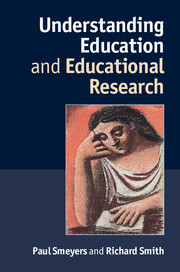Book contents
- Frontmatter
- Contents
- Acknowledgements
- Introduction
- 1 Education and its research
- 2 The nature of social science
- 3 The idea of method
- 4 The nature of philosophy
- 5 The art of research
- 6 Language, truth and meaning
- 7 On the dominant nature of educational research and its shortcomings
- 8 Research, policy and practical reasoning
- 9 The limits of measurement
- 10 Parenting and government intervention in the family (case study I)
- 11 Researching happiness and well-being (case study II)
- 12 Philosophy and research
- Notes
- References
- Index
7 - On the dominant nature of educational research and its shortcomings
Published online by Cambridge University Press: 05 November 2014
- Frontmatter
- Contents
- Acknowledgements
- Introduction
- 1 Education and its research
- 2 The nature of social science
- 3 The idea of method
- 4 The nature of philosophy
- 5 The art of research
- 6 Language, truth and meaning
- 7 On the dominant nature of educational research and its shortcomings
- 8 Research, policy and practical reasoning
- 9 The limits of measurement
- 10 Parenting and government intervention in the family (case study I)
- 11 Researching happiness and well-being (case study II)
- 12 Philosophy and research
- Notes
- References
- Index
Summary
Introduction
The need to apprehend the world one lives in is a fundamental part of the human condition. This apprehension includes understanding the meanings of various forms of expressions (concepts, symbol, art objects, rituals), of feelings and emotions, of actions in the world of human activity past and present (in terms of purposes, aims and more functional explanations) and, last but not least, the understanding of natural phenomena. In the context of the physical world, for instance, one may want to distinguish a unified style of explanation from explanations of a mechanical kind. The former explains in terms of basic comprehensive principles (for instance in biology: selection, mutation, heritability of traits) how phenomena fit into an overall scheme; the latter answers questions of how things work (sometimes understood as what they are made of). Here what one is looking for is of a causal nature. In terms of understanding a society, one may be interested in how it functions at large, what and why people do what they do, and their nature as human beings. ‘Understanding’ here refers to knowing how things are for those who are involved, so that their own interpretations can be taken into account. In many cases, however, the concept of causality seems to pervade our thinking about ourselves and others, about our environment, even about the entire universe we live in. Thus causal explanations appear fundamental to the intellectual understanding of physical systems and living organisms, and also to our practical deliberations in these contexts. They are involved in the use of technology (where we attempt to achieve particular effects while avoiding undesirable ones) and in our everyday practical planning and dealings. Not only physicists and engineers, but social scientists too, have been occupied since the Enlightenment with finding causes in order to be able to manipulate particular outcomes. Evidently, psychologists and educational researchers are no exception to this general tendency. Here too, for many, to explain an event is to identify its antecedents, i.e., its causes.
- Type
- Chapter
- Information
- Understanding Education and Educational Research , pp. 106 - 122Publisher: Cambridge University PressPrint publication year: 2014



